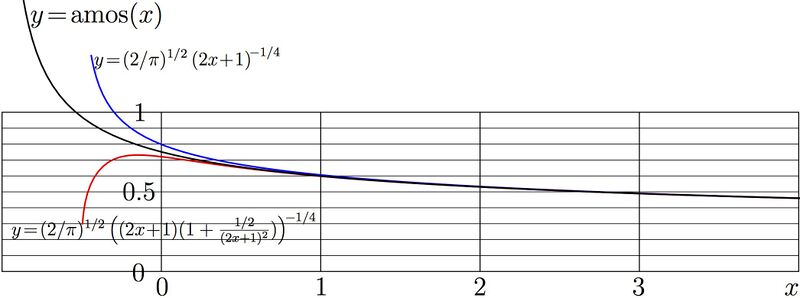File:Amoscplot.jpg

Original file (2,092 × 780 pixels, file size: 147 KB, MIME type: image/jpeg)
Explicit plot of function Amos that expresses the amplitude of oscillator function at zero versus its number. However, here, the number of oscillator function is treated as argument $x$; and, in general, this argument can take not only non–negative integer values, but also other real values (and even complex values).
The central black curve shows
$y=\,$Amos$(x)$ $ =\pi^{-1/4} \exp\!\Big( \frac{1}{2}$Lof$(x)-\,$Lof$\big(\frac{x}{2}\big)-\frac{x}{2}\ln(2)\Big)$ $ =\displaystyle \frac {2^{x/2} \, \sqrt{x!} } {\pi^{1/4}\, (x/2)! } $
The upper blue curve shows the upper asymptotic approximation,
$\displaystyle y\!=\! (2/\pi)^{1/2}\, \big(2x\!+\!1\big)^{\!-1/4}$
The lower red curve shows the lower asymptotic approximation,
$ y\!=\! (2/\pi)^{1/2}\, \Big((2x\!+\!1)\big(1+ \frac{1/2}{(2x+1)^2}\big)\Big)^{\!-1/4}$
The effective big parameter of expansion $2x\!+\!1$ has sense of the energy of the corresponding state of harmonic oscillator, at least for integer $x$ that can be interpreted as number of this state.
C++ generator of cirves
Files ado.cin and fac.cin should be loaded in order to compile the code below
#include <math.h>
#include <stdio.h>
#include <stdlib.h>
#define DB double
#define DO(x,y) for(x=0;x<y;x++)
//using namespace std;
#include <complex>
typedef std::complex<double> z_type;
#define Re(x) x.real()
#define Im(x) x.imag()
#define I z_type(0.,1.)
#include "fac.cin"
//#include "facp.cin"
//#include "afacc.cin"
//z_type Amp(z_type n){ return sqrt(fac(n)/sqrt(M_PI))/( exp((log(2.)/2.)*n)*fac(.5*n));}
z_type Amp(z_type n){ return exp( -.5*log(2.)*n + (.5*lof(n)-lof(.5*n)) )/sqrt(sqrt(M_PI));}
#include "ado.cin"
int main(){ int j,k,m,n; DB x,y, p,q, t; z_type z,c,d;
for(n=0;n<21;n++) {x=Re(Amp(0.+n));
y=sqrt( (2./M_PI) / ( sqrt( 2.*n+1. ) ) );
t=sqrt((2./M_PI)/sqrt((2.*n+1.) * (1+1./2./((2.*n+1.)*(2.*n+1.))) )) ;
printf("%2d %20.14lf %20.14lf %20.14lf %20.14lf %20.14lf\n",n,x,y,t,y-x,t-x);}
#define M(x,y) fprintf(o,"%6.4lf %6.4lf M\n",x+0.,y+0.);
#define L(x,y) fprintf(o,"%6.4lf %6.4lf L\n",x+0.,y+0.);
FILE *o;o=fopen("amoscplo.eps","w");ado(o,504,174);
fprintf(o,"102 2 translate\n 100 100 scale 2 setlinecap 1 setlinejoin\n");
for(m=-1;m<5;m++){ M(m,0)L(m,1) }
for(n=0;n<5;n++){ M( -1,n)L(4,n)}
fprintf(o,".006 W 0 0 0 RGB S\n");
for(n=1;n<10;n++){ M( -1,.1*n)L(4,.1*n)}
fprintf(o,".004 W 0 0 0 RGB S\n");
DO(n,59){x=-.44+.002*(n*n); y=sqrt((2./M_PI)/sqrt(2*x+1.));
if(n==0)M(x,y) else L(x,y); if(x>4) break;}
fprintf(o,".01 W 0 0 1 RGB S\n");
DO(n,59){x=-.495+.002*(n*n); y=sqrt((2./M_PI)/sqrt( (2*x+1.) * (1+1./2./((2*x+1.)*(2*x+1.)) )) ) ;
if(n==0)M(x,y) else L(x,y); if(x>4) break;}
fprintf(o,".01 W 1 0 0 RGB S\n");
DO(n,50){ x=-.88+.002*(n*(n+2)); y=Re(Amp(x)); if(n==0)M(x,y) else L(x,y);} fprintf(o,".01 W 0 0 0 RGB S\n");
fprintf(o,"showpage\n%c%cTrailer",'%','%'); fclose(o);
system("epstopdf amoscplo.eps");
system( "open amoscplo.pdf");
}
Latex generator of labels
\documentclass[12pt]{article}
\usepackage{geometry}
\paperwidth 504pt
\paperheight 188pt
\topmargin -96pt
\oddsidemargin -73pt
\pagestyle{empty}
\usepackage{graphicx}
\usepackage{rotating}
\parindent 0pt
\textwidth 800px
\textheight 900px
\newcommand \sx {\scalebox}
\newcommand \rot {\begin{rotate}}
\newcommand \ero {\end{rotate}}
\begin{document}
\begin{picture}(506,160)
\put(0,0){\includegraphics{amoscplo}}
%\put(20,10){\includegraphics{amosma}}
%\put(20,10){\includegraphics{lofma}}
%\put(20,10){\includegraphics{hermiga6ma}}
%\put(20,10){\includegraphics{hermiten6draft}}
%\put(84,116){\sx{1.5}{$y$}}
\put(85,97){\rot{0}\sx{1.4}{$1$}\ero}
\put(78,47){\rot{0}\sx{1.4}{$0.5$}\ero}
\put(84,-4){\rot{0}\sx{1.4}{$0$}\ero}
\put(99,-13){\rot{0}\sx{1.4}{$0$}\ero}
\put(199,-13){\rot{0}\sx{1.4}{$1$}\ero}
\put(299,-13){\rot{0}\sx{1.4}{$2$}\ero}
\put(399,-13){\rot{0}\sx{1.4}{$3$}\ero}
\put(495,-13){\rot{0}\sx{1.4}{$x$}\ero}
%
\put(20,159){\sx{1.4}{$y\!=\!\mathrm{amos}(x)$}}
%\put(50,122){\sx{1.5}{$y\!=\! (2/(x\!+\!1/2))^{1/4}\pi^{-1/2}$}}
%\put(54,124){\sx{1.3}{$\displaystyle y\!=\! \pi^{-1/2} \left( \frac{2}{x\!+\!1/2}\right)^{\!1/4}$}}
\put(60,132){\sx{1}{$\displaystyle y\!=\! (2/\pi)^{1/2}\, \big(2x\!+\!1\big)^{\!-1/4}$}}
%\put(60,132){\sx{1}{$ y\!=\! \left(\frac 2 \pi \right)^{\!1/2} \big(2x\!+\!1\big)^{\!-1/4}$}}
%\put(104,21){\sx{1.4}{$y\!=\! (2/x)^{1/4}\pi^{-1/2}(1-\frac{1}{8x})$}}
%\put(104,18.4){\sx{1.5}{$y\!=\! (2/x)^{1/4}\pi^{-1/2}(1-\frac{1}{8x})$}}
\put(8,25){\sx{1}{$ y\!=\! (2/\pi)^{1/2}\, \Big((2x\!+\!1)\big(1+ \frac{1/2}{(2x+1)^2}\big)\Big)^{\!-1/4}$}}
\end{picture}
\end{document}
References
File history
Click on a date/time to view the file as it appeared at that time.
| Date/Time | Thumbnail | Dimensions | User | Comment | |
|---|---|---|---|---|---|
| current | 06:10, 1 December 2018 | 2,092 × 780 (147 KB) | Maintenance script (talk | contribs) | Importing image file |
You cannot overwrite this file.
File usage
The following 2 pages use this file: